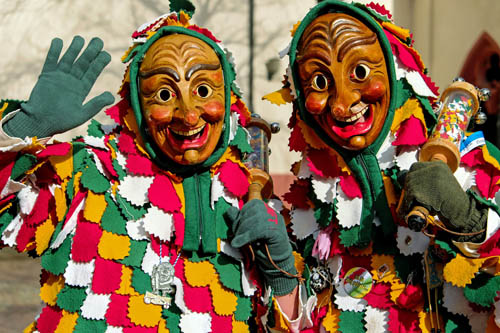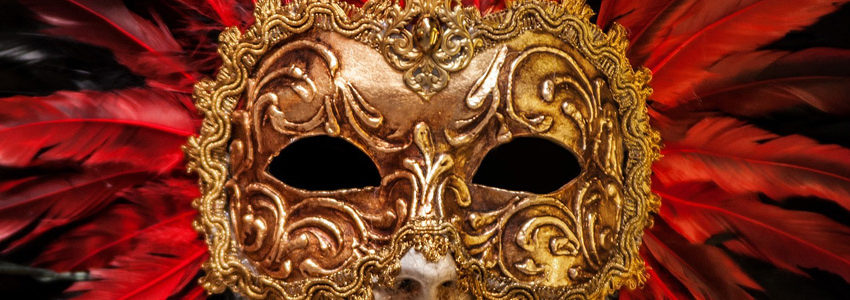Hello #Vivers! Carnival is approaching, one of the many festivities that students who come to receive Spanish classes in Madrid can enjoy.
Carnivals have become one of the most international festivals, conquering the hearts of people for generations. Its common characteristic is that it is a period of permissiveness and a certain lack of control. Illusion, costumes, colors, paintings, masks, dances, songs, lots of fun and, above all, the Carnival parades. All of this marks the character of the festival, but what is the origin of this traditional festival?
The origins of Carnival
 Although the true origins of Carnival are still unknown, historians estimate that the first celebrations that would later take the name Carnival took place years before the birth of Christ and have their origins in festivals related to agriculture. It seems that farmers gathered in summer with masked faces and fully painted bodies, around a bonfire, to celebrate the fertility and productivity of the soil, or to ward off evil spirits from the harvest.
Although the true origins of Carnival are still unknown, historians estimate that the first celebrations that would later take the name Carnival took place years before the birth of Christ and have their origins in festivals related to agriculture. It seems that farmers gathered in summer with masked faces and fully painted bodies, around a bonfire, to celebrate the fertility and productivity of the soil, or to ward off evil spirits from the harvest.
The first carnival celebration is located in Egypt. The party was nothing more than dancing, singing, and the participants wore masks and costumes as a symbol of the nonexistence of social classes. Later, the tradition spread to Greece where there was the custom of riding a boat with wheels (carrus navalis) and people danced all kinds of dances, around the 5.000th century BC. Also in Rome, numerous pagan festivals were held around the god. Bacchus, the god of wine, which is more than XNUMX years old.
These ceremonies had one point in common. They were associated with spiritual and astronomical phenomena and natural cycles. Likewise, they were manifested through expressions such as dance, chants, satire, masks and disorder. In a society with so many social differences, the festivals met the need for freedom for everyone. Rich and poor mixed together during the carnival, without recognizing each other under the fabric and masks of the costume.
Carnival Expansion
As a result of the expansion of Christianity, it gained momentum and the festival acquired the name carnival, with the main reason being to say goodbye to eating meat during the time of Lent. The etymology and origin of the word carnival indicates that it comes from the Italian term 'carnevale' and this in turn from the Latin 'carnem levare' whose meaning is carnem (meat) and levare (remove): to remove the meat.
 Quickly, the carnival reached Venice, and from there, it spread throughout the world. Little by little, its characteristics were shaped, depending on the customs of each country. Each city incorporated the habits of its culture. But, in general, carnival is defined through masks, costumes, floats, parades and dances, something common in all celebrations, regardless of the place where the Carnival celebration takes place. In fact, currently the Venice carnival is one of the best known in Europe. The tradition began when the nobility began to dress up to go out and mix with the people. The masks are the most important element of this characteristic carnival. Since then, this tradition spread throughout Europe, and later throughout Latin America thanks to Spanish and Portuguese navigators, starting in the XNUMXth century.
Quickly, the carnival reached Venice, and from there, it spread throughout the world. Little by little, its characteristics were shaped, depending on the customs of each country. Each city incorporated the habits of its culture. But, in general, carnival is defined through masks, costumes, floats, parades and dances, something common in all celebrations, regardless of the place where the Carnival celebration takes place. In fact, currently the Venice carnival is one of the best known in Europe. The tradition began when the nobility began to dress up to go out and mix with the people. The masks are the most important element of this characteristic carnival. Since then, this tradition spread throughout Europe, and later throughout Latin America thanks to Spanish and Portuguese navigators, starting in the XNUMXth century.
Carnival today
One of the places in the world where Carnival is most famous is Brazil. All cities take to the streets to worship Carnival to the rhythm of samba. It is one of the most spectacular parades organized worldwide. According to the Guiness Book of Records, the largest carnival celebration in the world is in Rio de Janeiro. Other internationally famous carnivals are those of Barranquilla in Colombia, Oruro in Bolivia, Venice in Italy, Veracruz and Mazatlán in Mexico, and Cádiz and Tenerife in Spain.
Above all, carnivals are about fun… a lot of fun!
Text adapted from: www.guiainfantil.com/articulos/celebraciones/carnaval/la-historia-del-carnaval-para-los-ninos
If you are looking for Spanish classes in Madrid to learn to speak Spanish fluently like a native and improve your grammar, stop by. Luis Vives Spanish School and take a look at the Spanish classes what we offer. They will surely adapt perfectly to your needs. Luis Vives Spanish School The best option to learn Spanish in the heart of Madrid!

